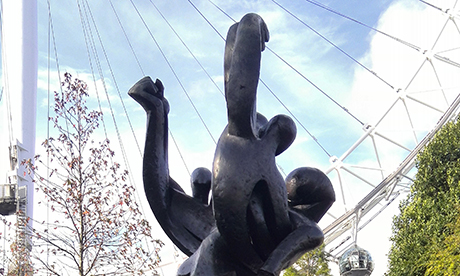How Hackney helped refugees from the Spanish Civil War

The International Brigades Memorial in Waterloo, central London. Photograph: Jay Unsworth
On a summer’s day in June 1937, eleven coaches carrying 400 Basque refugee children, victims of the Civil War then raging in Spain, pulled up outside Congress Hall on Limscott Road in Clapton.
Today the site of Clapton Girls’ Academy, Congress Hall was then owned by the Salvation Army and was one of the many homes set up across Britain to house the 3,826 ‘niños’ who had docked at Southampton a month earlier, in what remains the largest single influx of refugees ever to enter
Britain. The children, who arrived in Clapton each wore a label marked ‘Expedicion a Ingleterra’ alongside their name and the towns and villages from which they came.
They were met by a crowd of some two thousand Hackney residents waiting with gifts.
The Spanish Civil War, which broke out in July 1936 following a military coup led by General Francisco Franco against the democratically elected Republican government, had a deep impact on residents of Hackney. While Hitler and Mussolini sent soldiers and armaments to help Franco’s fascists, the British government preached non-intervention. Yet, as the politicians looked on, ordinary people were moved by the plight of Spain.
Many volunteers in the British contingent of the International Brigade came from Hackney, a great number of whom were Jewish. Celia Baker, who lived in Hackney and performed with the local Unity players, a radical workers’ theatre group, remembered her mother collecting tins of soup to send to Spain.
“There were all these little organisations that wanted to do something,” she recalled. “Everyone wanted to do something.’
Many who themselves had very little donated tins of soup or knitted blankets, seeing in Spain the fight for an alternative system which might herald a fairer world order.
For Hackney women like Ms Baker the war in Spain threatened the advances they had made in their mission for greater political, social and economic equality.
